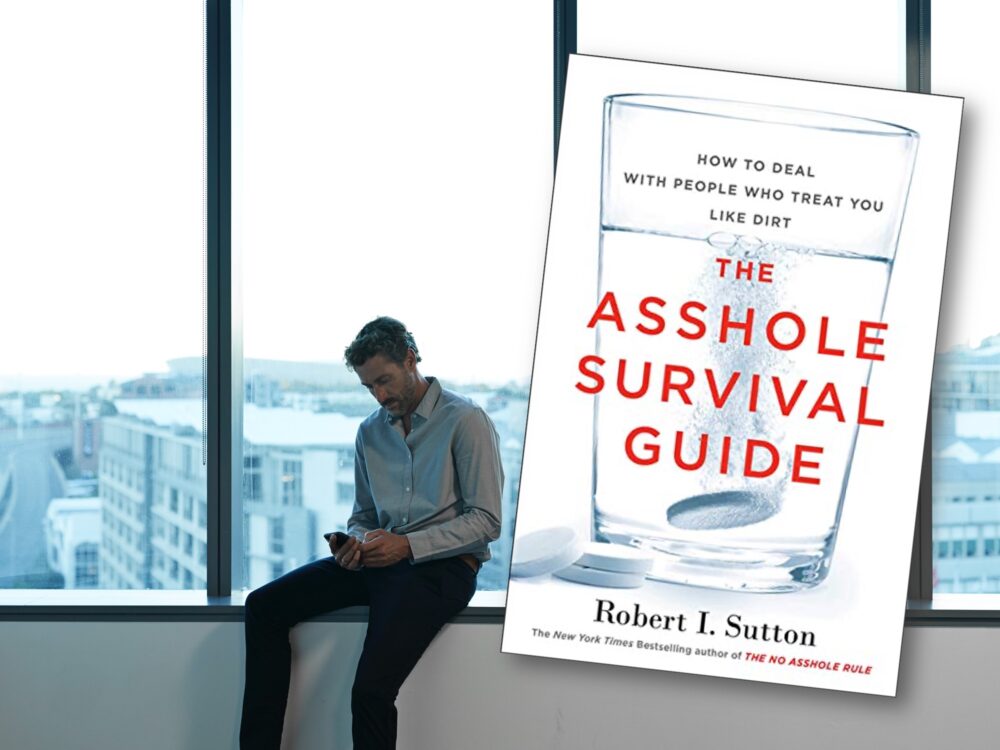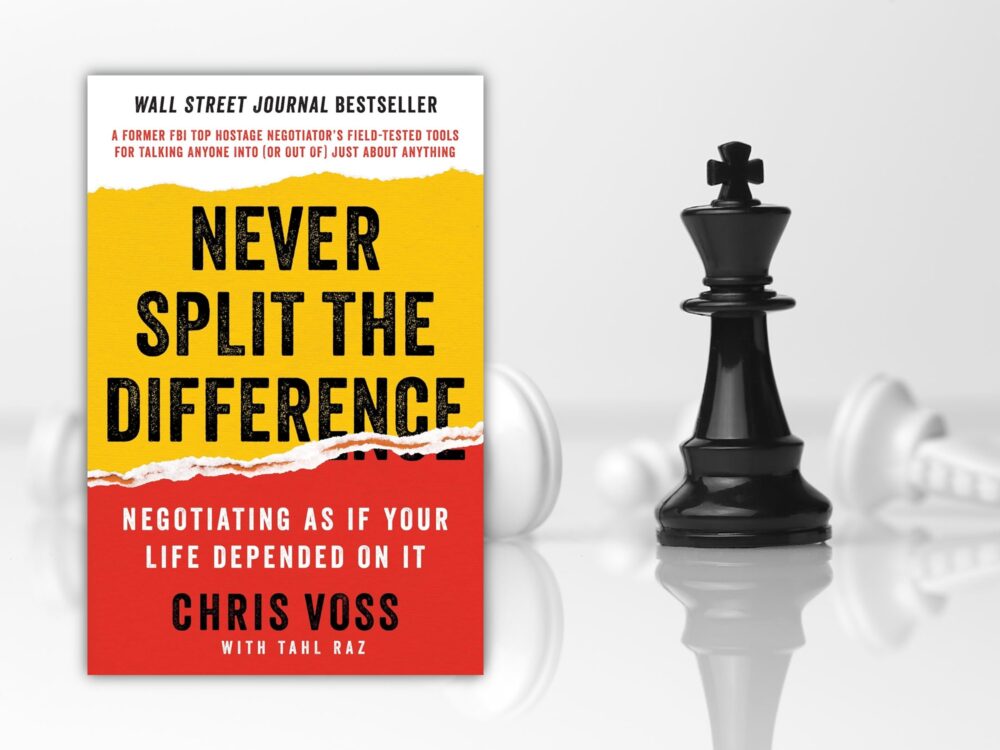Overview
‘The Asshole Survival Guide: How to Deal with People Who Treat You Like Dirt’ by Robert I. Sutton is a practical guide for navigating interactions with difficult individuals, particularly in the workplace. Sutton, a Stanford professor, builds on his previous work, “The No Asshole Rule,” by offering concrete strategies to identify, manage, and mitigate the impact of toxic behavior. The book is structured around diagnosing the type of “asshole” you’re dealing with and provides evidence-based tactics to avoid, outsmart, or neutralize their negative influence. Sutton also emphasizes the importance of self-reflection to ensure that readers don’t inadvertently become the very problem they’re trying to solve.
Synopsis
The book is organised in seven chapters that can be summarised as follows:
- Eight Thousand Emails
This chapter sets the stage by illustrating the prevalence of toxic behavior in various environments, particularly the workplace. Sutton shares anecdotes and data from thousands of emails he received from people dealing with “assholes” in their lives. These stories highlight the emotional and psychological toll such individuals can have on others, emphasizing the need for effective strategies to cope with and mitigate their impact.
- Asshole Assessment: How Bad Is the Problem?
In this chapter, Sutton provides tools and criteria to assess the severity of the problem. He helps readers identify whether they are dealing with a temporary jerk or a certified ‘asshole’. The chapter includes self-assessment quizzes and diagnostic tools to measure the frequency and intensity of the negative behavior, helping readers understand the scope of the issue and decide on the best course of action.
- Make a Clean Getaway
This chapter focuses on the importance of removing oneself from toxic environments whenever possible. Sutton discusses the benefits of quitting a job or ending a relationship with a toxic person. He provides practical advice on how to plan an exit strategy, including financial and emotional preparation, to ensure a smooth transition to a healthier environment.
- Asshole Avoidance Techniques: Reducing Your Exposure
Here, Sutton offers strategies to minimize interactions with toxic individuals. He suggests practical techniques such as physical avoidance, setting boundaries, and using technology to limit contact. The chapter also covers how to navigate unavoidable interactions by maintaining professionalism and emotional distance.
- Mind Tricks That Protect Your Soul
This chapter delves into psychological strategies to protect one’s mental health when dealing with toxic people. Sutton introduces cognitive techniques such as reframing negative experiences, practicing mindfulness, and focusing on positive aspects of life. These mind tricks help readers build resilience and maintain their well-being despite ongoing exposure to toxic behavior.
- Fighting Back
In this chapter, Sutton discusses when and how to confront toxic individuals. He provides tactics for assertive communication, setting firm boundaries, and enlisting support from allies. The chapter also covers the risks and potential consequences of fighting back, helping readers weigh their options and choose the most effective approach for their situation.
- Be Part of the Solution, Not the Problem
The final chapter encourages readers to reflect on their own behavior and strive to create a positive environment. Sutton emphasizes the importance of self-awareness and empathy, urging readers to avoid becoming ‘assholes’ themselves. He provides tips for fostering a respectful and supportive atmosphere in both personal and professional settings, contributing to a healthier and more productive community.
Why you should read it?
‘The Asshole Survival Guide’ is an interesting and useful read for all team members because it provides practical, relatable advice on dealing with difficult people in everyday work situations. Sutton’s use of real-life examples and straightforward language makes the strategies accessible and easy to implement. For employees who might feel powerless against toxic behavior, the book offers empowering techniques to protect their mental health and maintain a positive work environment. By learning how to effectively manage interactions with ‘assholes’, employees can reduce stress, improve their job satisfaction, and foster better relationships with their peers.
For managers, the book is particularly valuable as it addresses the broader impact of toxic behavior on team dynamics and organizational culture. Managers are often responsible for maintaining a healthy work environment, and Sutton’s insights can help them identify and address toxic behavior before it escalates. The book provides managers with tools to support their team members, set clear behavioral expectations, and create a more respectful and productive workplace. By applying these strategies, managers can enhance team morale, reduce turnover, and ultimately drive better performance and results for their organization.
Critics and review
‘The Asshole Survival Guide’ by Robert I. Sutton has been extremely well received by both critics and readers. Behind its catchy and provocative title lies a serious and practical guide to dealing with toxic individuals, particularly in the workplace. Critics have praised Sutton’s ability to blend humor with serious advice, making the book both entertaining and informative. The real-life examples and research-based strategies provide readers with actionable steps to manage and mitigate the impact of difficult people.
While the book has garnered mostly positive reviews, some critics have pointed out that the advice can sometimes feel repetitive or overly simplistic. However, these critiques are often overshadowed by the overall positive reception. Readers appreciate Sutton’s engaging writing style and the practical nature of his advice.
The book is not just that sort of book where the provocative title is meant to attract attention; it delivers substantial content that is both useful and enjoyable to read.
Verdict
‘The Asshole Survival Guide’ by Robert I. Sutton is an indispensable read for anyone navigating the complexities of workplace dynamics. With its blend of humor and serious advice, the book offers practical, research-backed strategies to handle toxic individuals effectively. Sutton’s engaging writing style and real-life examples make the content both relatable and actionable, ensuring readers can apply the insights to their own situations.
About the author
Robert I. Sutton is a renowned organizational psychologist and professor of management science and engineering at Stanford University. He has dedicated his career to studying leadership, innovation, organizational change, and workplace dynamics. Sutton earned his Ph.D. in organizational psychology from the University of Michigan in 1984 and has since published over 200 articles, chapters, and case studies in both scholarly and applied outlets. His work is highly regarded in the field of evidence-based management, and he is known for his engaging and accessible writing style.
Sutton is also a prolific author, with several best-selling books to his name. His notable works include ‘The No Asshole Rule: Building a Civilized Workplace and Surviving One That Isn’t’, which addresses the impact of toxic behavior in the workplace and offers strategies for fostering a more respectful environment. Other popular titles by Sutton include ‘Good Boss, Bad Boss: How to Be the Best… and Learn from the Worst,’ which explores the qualities of effective leadership, and ‘Scaling Up Excellence: Getting to More Without Settling for Less’, co-authored with Huggy Rao, which provides insights into how organizations can scale successfully while maintaining high standards.
#BookReview #WorkplaceWellness #Leadership #SelfHelp #RobertSutton









Leave a Reply